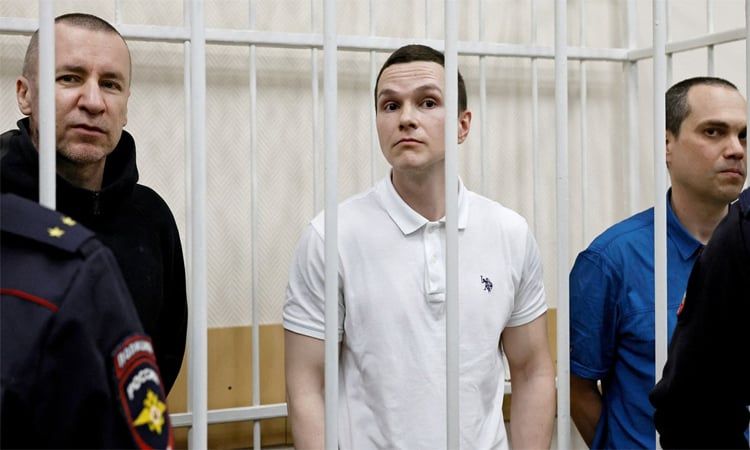Russia Sentences Three Lawyers Defending Alexei Navalny to Prison, Stoking Concerns Over Legal Repression

On Friday, three lawyers who had defended Russian opposition leader Alexei Navalny were sentenced to prison terms for allegedly relaying messages from the late activist while he was imprisoned, fueling concerns over Moscow’s escalating crackdown on dissent.
Vadim Kobzev, Alexei Liptser, and Igor Sergunin were convicted by a court in Petushki, a town located about 115 kilometers east of Moscow. The three lawyers were found guilty of being part of an “extremist organization” for their involvement in facilitating communication between Navalny and the outside world while he was serving his 19-year sentence. Navalny, who had been one of President Vladimir Putin’s most vocal critics, communicated with his supporters and the public through these lawyers, relaying messages denouncing the Kremlin’s policies, including its invasion of Ukraine.
Kobzev, the most high-profile of the three, was sentenced to five and a half years in prison, while Liptser received five years, and Sergunin was sentenced to three and a half years. These lawyers had been among the few visitors to Navalny in prison, and the messages they helped circulate were pivotal in keeping his political activism alive, even from behind bars.
In a statement following the verdict, Navalny’s exiled widow, Yulia Navalnaya, called the three men “political prisoners” and demanded their immediate release. She also denounced the ongoing repression, noting that her late husband had been targeted even after his death in February 2024, allegedly at the hands of Russian authorities in an Arctic prison colony.
The sentences come amidst growing concerns about Russia’s treatment of political prisoners and legal representatives. The Russian government’s actions against the lawyers have drawn sharp criticism from international human rights organizations. The Netherlands called it a “new low point” for the already dire human rights situation in Russia, while Germany emphasized the harsh persecution faced by those who defend others in court. British Foreign Minister David Lammy also condemned the sentencing, stressing that the Kremlin must release all political prisoners, including those who remain incarcerated for their efforts to oppose the government.
The trial, which was conducted behind closed doors, centered around allegations that the lawyers were using their status to facilitate the transfer of information from Navalny to members of what the court described as an “extremist community,” including individuals wanted by the Russian government. The court claimed that Navalny, while in prison, was able to continue “planning crimes with extremist character” by transmitting messages with the help of his lawyers. The content of Navalny’s messages, which were published on social media, included condemnations of the Russian government’s actions, particularly its ongoing invasion of Ukraine, which he referred to as “criminal.”
In a striking contrast to the current repression, Navalny himself was a lawyer and had long been known for his legal challenges to the government, using the court system as a platform to voice his defiance. His arrest and the subsequent crackdown on his associates have been part of a broader strategy by the Kremlin to eliminate political opposition.
Kobzev, speaking in court, decried the trial, which he compared to Stalin-era repression, lamenting that nearly eighty years after such events, people were once again being prosecuted for opposing state authorities. The sentencing has raised alarm among rights groups, including OVD, an organization that monitors political repression in Russia. OVD warned that these sentences signify the Russian government’s increasing effort to make defending political prisoners a perilous act.
The International Lawyers Association (UIA) also warned that the trial sets a dangerous precedent, which could dissuade other lawyers from representing clients involved in politically sensitive cases. The group expressed concerns about the chilling effect on the legal profession in Russia, suggesting that defending politically persecuted individuals could soon become an offense in itself.
Furthermore, despite Alexei Navalny’s death, his name continues to be associated with state-enforced repression. His widow revealed that Russian authorities had refused to remove Navalny from their list of “terrorists and extremists,” even posthumously. A December letter from Russia’s financial watchdog, Rosfinmonitoring, confirmed that investigations into Navalny, including accusations of money laundering and financing terrorism, were still ongoing.
Yulia Navalnaya criticized the ongoing investigations, suggesting that the government’s primary motive was not to prevent her husband from accessing bank accounts, but to intimidate and silence those who continue to oppose Putin’s regime.
As the Kremlin tightens its grip on dissent, these latest actions against Navalny’s legal team reflect a broader strategy of silencing opposition and restricting fundamental freedoms within Russia.





